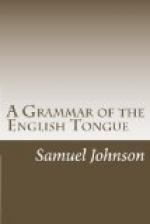Pronunciation is just, when every letter has its proper sound, and every syllable has its proper accent, or, which in English versification is the same, its proper quantity.
The sounds of the letters have been already explained; and rules for the accent or quantity are not easily to be given, being subject to innumerable exceptions. Such, however, as I have read or formed, I shall here propose.
1. Of dissyllables, formed by affixing a termination, the former syllable is commonly accented, as childish, kingdom, actest, acted, toilsome, lover, scoffer, fairer, foremost, zealous, fulness, godly, meekly, artist.
2. Dissyllables formed by prefixing a syllable to the radical word, have commonly the accent on the latter; as to beget, to beseem, to bestow.
3. Of dissyllables, which are at once nouns and verbs, the verb has commonly the accent on the latter, and the noun on the former syllable; as, to descant, a descant; to cement, a cement; to contract, a contract.
This rule has many exceptions.
Though verbs seldom have their accent on
the former, yet nouns often
have it on the latter syllable; as delight,
perfume.
4. All dissyllables ending in y, as cranny; in our, as labour, favour; in ow, as willow, wallow, except allow; in le, as battle, bible; in ish, as banish; in ck, as cambrick, cassock; in ter, as to batter; in age, as courage, in en, as fasten; in et, as quiet; accent the former syllable.
5. Dissyllable nouns in er, as canker, butter, have the accent on the former syllable.
6. Dissyllable verbs terminating in a consonant and e final, as comprise, escape; or having a diphthong in the last syllable, as appease, reveal; or ending in two consonants, as attend; have the accent on the latter syllable.
7. Dissyllable nouns having a diphthong in the latter syllable, have commonly their accent on the latter syllable, as applause; except words in ain, certain, mountain.
8. Trissyllables formed by adding a termination, or prefixing a syllable, retain the accent of the radical word; as, loveliness, tenderness, contemner, wagonner, physical, bespatter, commenting, commending, assurance.
9. Trissyllables ending in ous, as gracious, arduous; in al, as capital; in ion, as mention; accent the first.
10. Trissyllables ending in ce, ent, and ate, accent the first syllable, as countenance, continence, armament, imminent, elegant, propagate, except they be derived from words having the accent on the last, as connivance, acquaintance; or the middle syllable hath a vowel before two consonants, as promulgate.
11. Trissyllables ending in y, as entity, specify, liberty, victory, subsidy, commonly accent the first syllable.
12. Trissyllables in re or le accent the first syllable, as legible, theatre, except disciple, and some words which have a position, as example, epistle.




